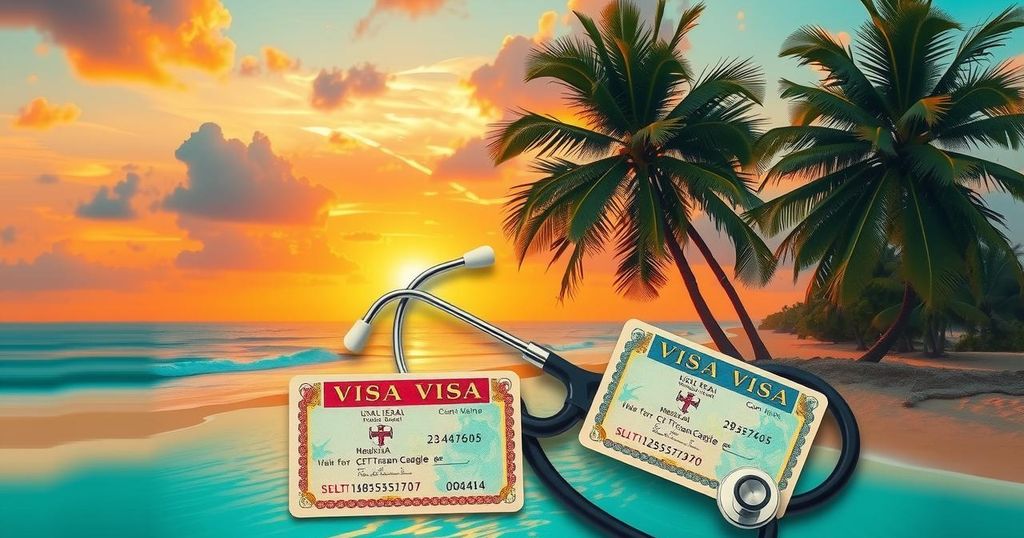Politics
AFRICA, AMERICA FIRST, ANDREW HOLNESS, CUBA, DEMOCRACY, DONALD TRUMP, FOREIGN POLICY, FOSTER COLLEGE, GC, GC FOSTER COLLEGE, HAITI, HEALTH CARE, JAMAICA, JAMAICA LABOUR PARTY, JAMAICA OBSERVER, JLP, JOSÉ MARTÍ HIGH, KEITH ROWLEY, KINGSTON, LEADERSHIP, MARTI, MICHAEL MANLEY, NORTH AMERICA, PEOPLE ’ S NATIONAL PARTY, PNP, REUTERS, SOCIAL INTEGRATION, TRINIDAD AND TOBAGO, UNITED STATES, UNITED STATES GOVERNMENT, US, US ADMINISTRATION, WASHINGTON, WEST AFRICA
Leila Ramsay
0 Comments
Jamaica’s Diplomatic Quandary: US Visa Threats and Cuban Medical Missions
This article explores the implications of the US’s threats to revoke visas for Caribbean officials connected to Cuban medical missions, testing Jamaica’s historical ties with both Cuba and the United States. Leaders express determination to maintain healthcare services from Cuba, even at the risk of losing US travel privileges, highlighting the complex diplomatic landscape they navigate.
In the 1970s, former Prime Minister Michael Manley expressed Jamaica’s determination to remain resilient amidst the ideological strife between Eastern and Western powers. The current dynamics see Jamaica facing a critical challenge due to the US Administration’s threats to revoke visas for officials linked to Cuban medical missions. This situation tests Jamaica’s diplomatic relations with both Cuba and the United States, vital partners in varying capacities.
Jamaica, along with other Caribbean nations participating in Cuban medical missions, is caught in a dilemma. The nation treasures its longstanding ties with both Cuba and the United States, knowing that the latter represents major trade and migration opportunities. Prime Minister Andrew Holness is expected to approach this issue with the diplomacy characteristic of the present, contrasting with Manley’s more confrontational stance.
Cuba has historically supported Jamaica in challenging times by sending medical personnel and establishing community programs, positively impacting Jamaican society. Losing the contribution of Cuban medical staff would severely diminish the country’s healthcare system, especially amidst the global trend of skilled professionals being attracted to wealthier countries.
Leaders from affected nations, such as Trinidad’s Prime Minister Rowley and St Vincent’s Gonsalves, emphasize the importance of Cuban medical personnel. They voiced strong sentiments, indicating a readiness to forgo US visas to ensure ongoing healthcare services critical to their populations. Their comments reflect a collective commitment to prioritize citizens’ health over political affiliations.
Jamaican Foreign Minister Kamina Johnson Smith highlighted the significant presence of 400 Cuban medical professionals within Jamaica’s healthcare system, underscoring their role. Similarly, Barbados Prime Minister Mia Mottley expressed her willingness to sacrifice her US visa for the continued support of Cuban personnel, particularly noted during the COVID-19 pandemic. The situation indeed represents a delicate balancing act for Caribbean leaders amidst international pressures.
In conclusion, Jamaica’s current diplomatic conundrum embodies a historical legacy of resilience and strategic partnership. The potential loss of Cuban medical personnel poses significant risks to Jamaica’s healthcare infrastructure—one that many regional leaders are willing to defend, even at the cost of their US visas. As they navigate these tensions, the emphasis remains squarely on preserving essential health services for their citizens in the face of external pressures.
Original Source: www.jamaicaobserver.com




Post Comment